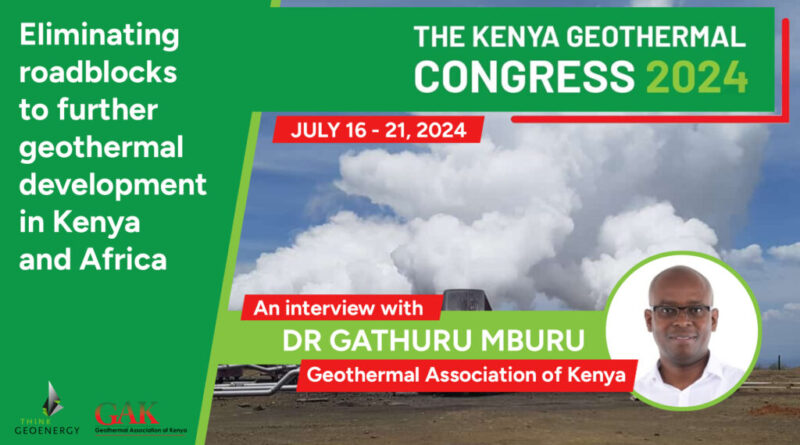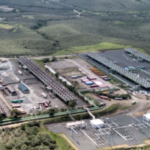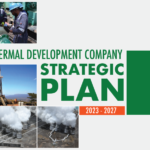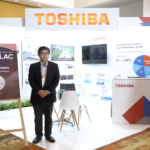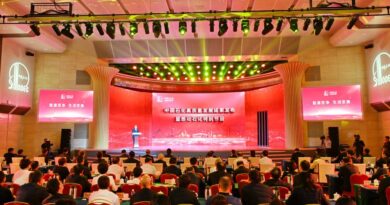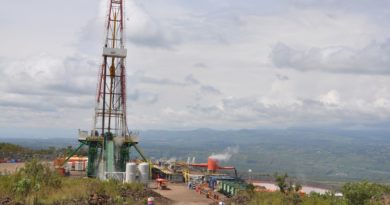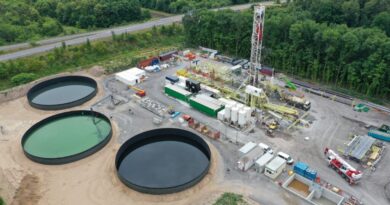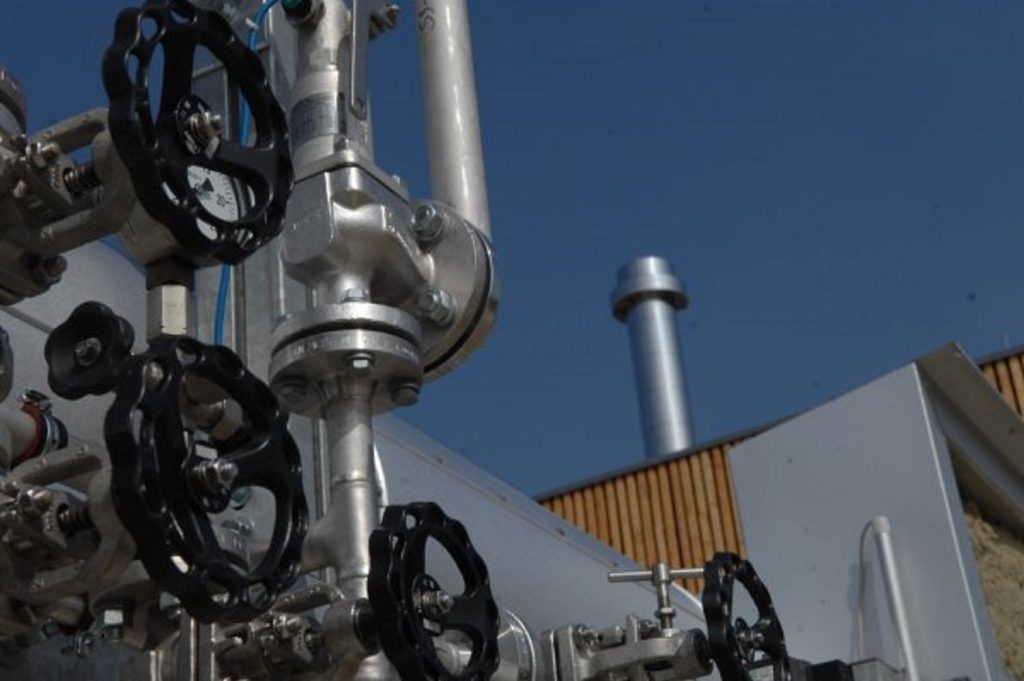Interview – Eliminating roadblocks to further geothermal development in Kenya and Africa
Energy Disrupter
In this interview, Dr Gathuru Mburu discusses the current state and further support needed for geothermal in Kenya, and what to expect in the upcoming KGC.
With Kenya soon to join the 1-GW club of geothermal power producers, the momentum of development is certainly in the favor of the East African country. This is, however, an under-representation of the geothermal potential of Kenya. With plenty of potential that is yet to be developed, what else does Kenya need in terms of policy and financial support to further accelerate geothermal development?
As we build up to the 2024 Kenya Geothermal Congress, we talked to Dr Gathuru Mburu of the Geothermal Association of Kenya to discuss what has made Kenya successful so far in the field of geothermal, identify further roadblocks that need to be addressed, and the role that Kenya plays for the wider geothermal movement in Africa.
What have been the driving factors for the growth of geothermal in Kenya that has led to its status as one of the global geothermal leaders?
The first critical key factor for geothermal in Kenya has been the presence of the resource. The East Africa Rift Valley cuts through Kenya from north to south. This Rift Valley has a huge geothermal resource. We are fortunate to be sitting on this reservoir, and what we just need to do now is to tap into it.
Another key factor that has driven geothermal growth in Kenya has been the government policy. The Kenyan government decided that the geothermal sector is a strategic sector for energy security a number of years back. Thus, along with international partners, the government invested in geothermal research and exploration. These early efforts paid off in developing our geothermal resource which is now contributing to almost 50% of the power production in Kenya.
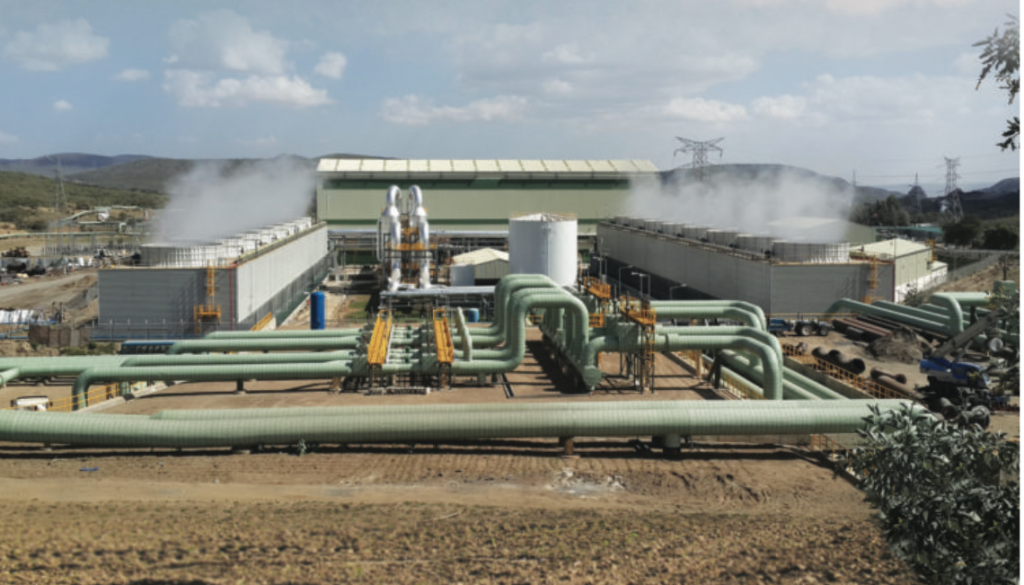
Another key element is the economy of Kenya. Over the last 40 years, our economy has grown by an average of about 5% per annum. This economic growth has accordingly resulted in a growth in demand for energy. Right now, we have high demand from industry, manufacturing, residential, and other commercial activities. In order for us to continue growing as a country, we need to industrialize. This will demand even more energy. The government has made it very clear that the additional energy source will come from geothermal.
We are in a very fortunate position to have the geothermal resources to develop, a growing demand for energy, and a government that has made clear that it supports the growth of geothermal.
What are the policies that the Kenyan Government has implemented to support geothermal?
To understand policy support for geothermal in Kenya, we need to review and understand the legal framework in which geothermal operates. We have a National Energy Policy that makes it clear that renewables should be a key component of Kenya’s energy mist. The country is currently at about 95% renewable energy to the electricity grid. A plan is now in place to close the 5% gap. Percentage-wise, we are a global leader in terms of transitioning our electricity grid to clean energy.
There is also the Geothermal Resources Act. This is a document that has gone through Parliament and came into force in 1982 that stipulates how geothermal resources will be explored, developed, and produced. This law has been instrumental in the growth of the sector because it has helped bring on board key institutions like the Kenya Electricity Generating Company (KenGen), which is a state-owned enterprise, partially listed in the Nairobi Stock Exchange, that now develops and operates geothermal power plants. There is also the Geothermal Development Company (GDC) which has been a key player in de-risking geothermal field and developing these fields so that they can supply and sell steam.
Another critical aspect, by way of government support, is the funding for geothermal projects. Without significant amounts of capital, it is not possible to do the drilling and the development of infrastructure needed to produce power.
The government has played a key role over the many, many years to develop the geothermal resource in Kenya. This is also one of the reasons for Kenya leading the geothermal industry in Africa.
Beyond power generation, are there plans for Kenya to harness geothermal resources for other applications? How significant are these direct-use projects in improving the economics of geothermal in Kenya?
It is very important for us in Kenya to look at different applications for geothermal energy. KenGen has already built a geothermal recreational facility in Naivasha. This has been operational for a number of years. This facility is a spa and wellness center where people can go bathe in geothermal waters which has therapeutic benefits. It is very popular and is typically fully booked during weekends and public holidays.
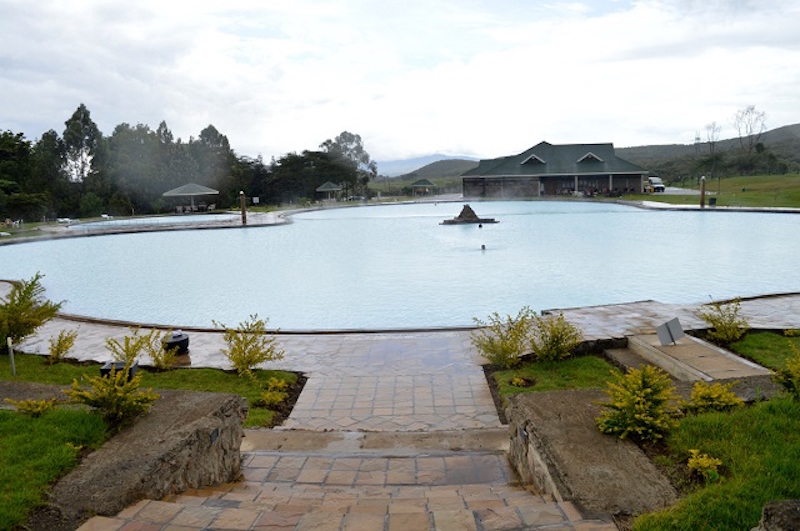
Even with this facility already in place, we need to do much more for direct use geothermal. There are potential applications that need to be promoted. For example, geothermal can be used for temperature control in greenhouses. In the Naivasha area, we have a very important flower growing area that produces flowers both for the local market and for export. Kenya is currently supplying almost a third of the fresh flowers into the European market. Geothermal is a very important energy sources for controlling temperatures in these greenhouses, thus creating an environment for the flowers to thrive.
There are already about one or two companies that are using geothermal for growing flowers, but we want to see this grow into a much wider industry.
To facilitate more uses of geothermal steam and brine for manufacturing, we are currently constructing Special Economic Zones or industrial parks near the geothermal fields. The intention is to provide fiscal incentivization to attract manufacturing firms that can offtake not just geothermal power, but also heat for direct-use applications. We are looking forward to the future in the field of direct-use industrial applications and there is so much more that we can do.
Is there any currently ongoing project or initiative that is particularly exciting for you?
I think the development in the Baringo-Silali area of the Rift Valley by the Geothermal Development Company is extremely exciting. They have essentially de-risked the field and confirmed that there is a resource. The next step now is to develop and produce geothermal power and also looking at other uses for the resource.
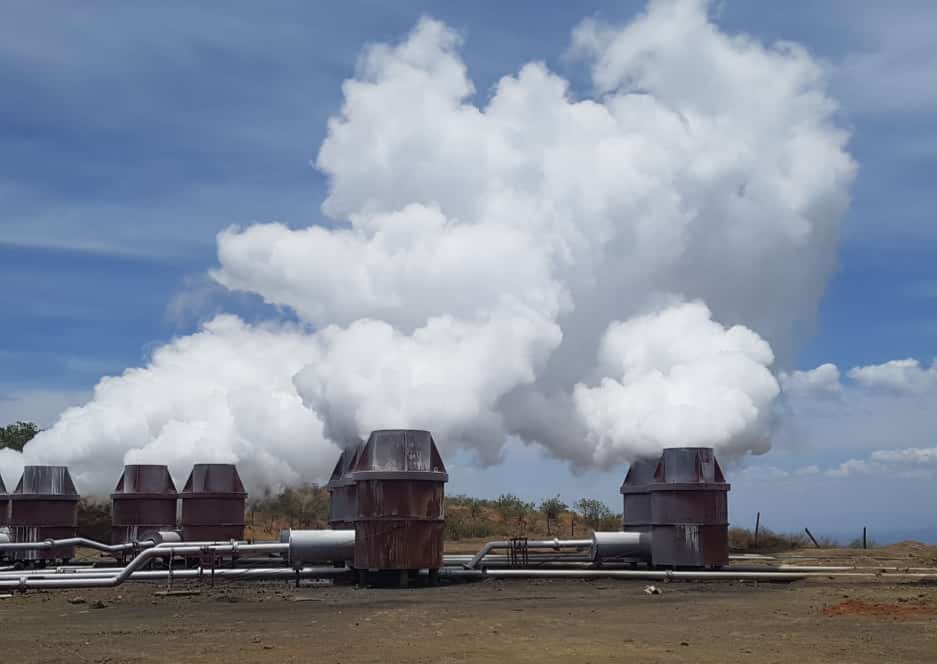
They have made great efforts to now bring on board private partners to finance these projects through what we call public-private partnerships (PPPs). I think this will be very exciting. GDC has proven that they can do it in the Menengai field. And so we can look forward in the next couple of years for wonderful developments across the Rift Valley of Kenya.
What other large-scale power users can viably establish facilities in Kenya to take advantage of the country’s geothermal resources, similar to the data centres that are being planned?
I think the idea is anything that is a concentrated facility that has a demand for huge amounts of power, and would like to be producing it from 100% green Energy is a candidate.
You mentioned data centers. I want to extend that potential further within the computing space to artificial intelligence centers, or centers that do the computational work for general artificial intelligence. The neural processing units (NPU) chips are huge consumers of power and these companies are also looking at how can they reduce their carbon footprint. With the growth of artificial intelligence demanding huge sources of power, I think that it can be one of the primary offtakers for geothermal.
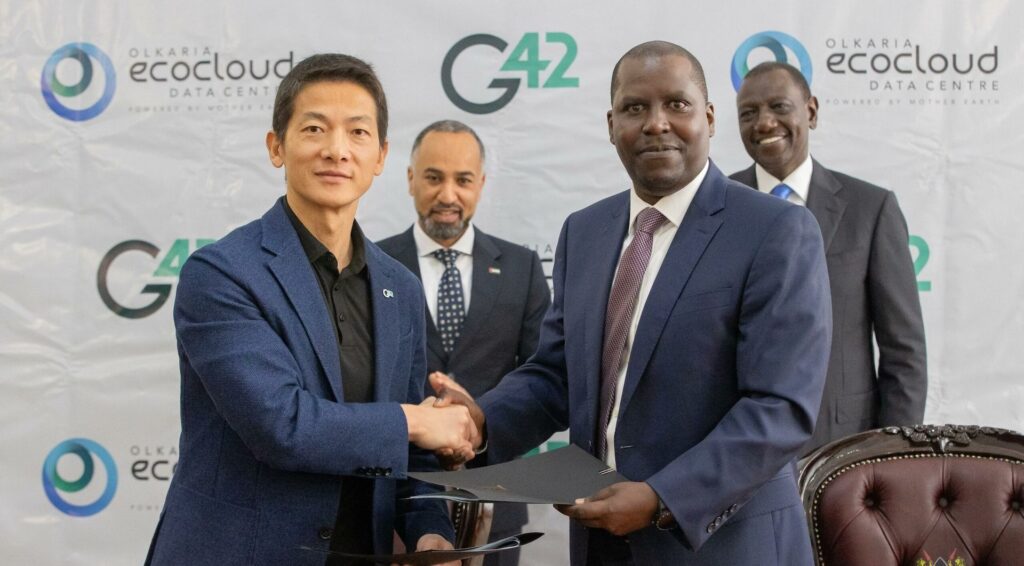
Another potential application that also demands huge power is hydrogen production. Local and international companies have expressed interest and are currently doing research in Kenya on this topic. They are trying to understand the economics around it and are also trying to fine-tune the technology around it. Hydrogen will have many uses as it can be directly used to power engines, thus powering aircraft and ships with green energy. It can also be converted to create fertilizers for agriculture and that would be a huge win for Kenya for Africa, because food security is also important. If geothermal can contribute to the production of hydrogen and, consequently, of fertilizers, then that has a direct impact on the population.
Another area that I think has a very high potential for the use of geothermal power is mineral processing. Africa is a huge producer of minerals. If we look at the critical minerals that are required for the energy transition, a lot of the critical minerals in the value chain are mined in Africa, including Kenya. Those minerals typically are mined and then exported, as the ore is processed elsewhere. We now see a wonderful opportunity to process these minerals with green energy so that we can have truly a green value chain.
For instance, we can talk about green steel, where the processing was done using green energy. There is also the opportunity to establish these mineral processing plants close to where the geothermal resources are. We can use the very well-known principles of electricity wheeling to deliver the electricity from where the geothermal is, to where the processing of the minerals may be. For example, Kenya has abundant geothermal resources. We can then wheel the power to Lubumbashi in the Democratic Republic of Congo, so that they can then smelt the copper that is used in electrical vehicles, in wind power plants, right there at the source.
We can look at with the objective of creating a holistic solution for achieving the Net Zero goals. I think geothermal is going to play a central role in this movement.
What is the role that Kenya plays in further promoting geothermal in Africa and helping other African countries in developing their own geothermal resources?
I think one of the things that is not fully recognized is the knowledge and skill level in Kenya in relation to geothermal exploration, development, and production. When we look at what is being done for geothermal in the rest of Africa, and predominantly Eastern Africa, it is being driven by the knowledge and skills of the geothermal business. There is already a deep understanding of how the geothermal business is done in Kenya that can be exported to other African countries.
Of course, there are some factors where I think we, as Kenya, need to dig deeper and assist. As you know, geothermal is a very capital-intensive business and it is very challenging to raise the financing to do the actual work in the initial phases of de-risking a project. Kenya now understands how to do this, and the great thing is that we have had success. And as expected, finance and money follow success. I think we can leverage this excellent track record to assist other African countries and convince various financing partners, including bilateral, multilateral, and private and public players, that there is the opportunity to develop geothermal in these countries.
What are the remaining challenges that are still holding back Kenya from realizing its full geothermal potential?
Even with a growing recognition of geothermal as a source of renewable energy that can deliver reliable baseload power supply, we are not seeing enough financial commitments to accelerate the development of this resource. Coming of the Africa Climate Summit, Kenya has committed that it is ready to develop its renewable energy sources. We are ready to produce enough geothermal power to power Africa. But to be able to do this, we will need the infrastructure, the grid, and the transmission network.
The sources of capital are not putting the money on the able, or are not doing it to the extent to which we hoped. We also understand that, to achieve, this we need to present a solid financial investment opportunity and that we are able to pack back any loans we take. However, we really need the capital to facilitate this development.
Looking at the example of GDC, they already have everything on the ground – a very good proven geothermal resource, as well as the licenses and rights to develop it. They have the capacity to absorb hundreds of millions of dollars and use the funding to drill wells, de-risk the resource, and sell the steam to offtakers. However, the lack of flow of capital for the project is hindering the resource’s full development.
What can participants expect at the upcoming Kenya Geothermal Congress?
Related to the previous answer, the theme of the Kenya Geothermal Congress is related to the mobilization of financing to accelerate the development of geothermal in Kenya. We seek to understand the issues in policy, technology, and most importantly, financing that are holding us back from accelerating Kenya’s geothermal development.
The participants can look forward to a fantastic program of keynote speeches and expert presentations. From the highest level in government, the chief guests being His Excellency, the President of Kenya, William Ruto, and Cabinet Secretary for Energy, and the Principal Secretary for Energy in Kenya. We have also invited key industry leaders from African countries, including the ministers.
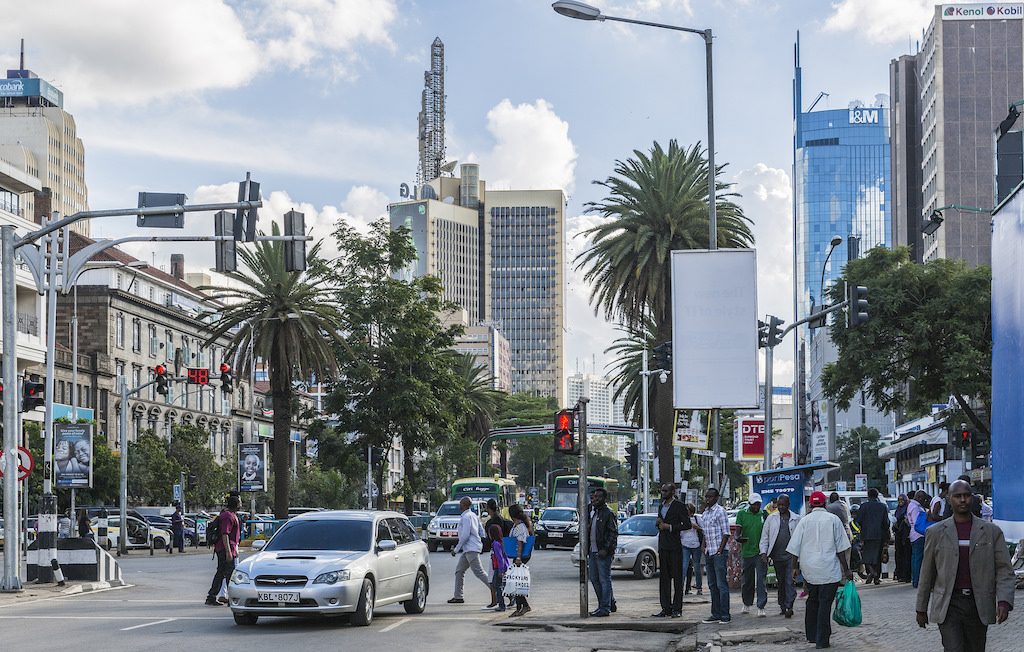
From around the world, there will be presentations from key international partners and players who are experts in their fields. There will be panel discussions and over 150 technical papers presented.
KGC will also be a great opportunity to network. There will be informal tables to get to know each other and understand how we can support each other. We will be having exhibitions from local and international companies to share their knowledge and talk about their technologies and projects.
There will also be having training sessions during the Congress days. These will provide opportunities to understand and discuss specific pertinent issues that are taking place in Kenya. We will also have site visits and field trips to the geothermal areas in Kenya, both the ones that are producing and also the ones that are being developed. This is another wonderful opportunity to be part of understanding Kenya’s trajectory in geothermal.
We also look forward to hosting our gala awards ceremony where we will recognize the local, regional, and international partners and players who have been vital in establishing geothermal in Kenya, growing it, bringing it to where it is today, and having a vision of where we want to take it.
Register or learn more about the 2024 Kenya Geothermal Congress at the official event website.

